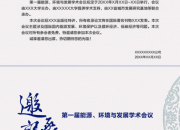英语作文写作的需要背诵的部分(4)
时间:2021-08-31As any parent knows, teaching character is a difficult task. But it is a crucial task, because we want our children to be healthy, happy, and successful but decent, strong, and good. None of this happens automatically; there is no genetic transmission of virtue. It takes the conscious, committed efforts of adults. It takes careful attention.
10. College Pressures
Mainly I try to remind that the road ahead is a long one and that it will have more unexpected turns than they think. There will be plenty of time to change jobs, change careers, change whole attitudes and approaches. They don not want to hear such liberating news. They want a map—right now – that they can follow unswervingly to career security, financial security, Social Security and, presumably, a prepaid grave.
What I wish for all students is some release from the clammy grip of the future. I wish them a chance to savor each segment of their education as an experience in itself and not as a grim preparation for the next step. I wish them the right to experiment, to trip and fall, to learn that defeat is as instructive as victory and is not the end of the world.
My wish, of course, is na?ve. One of the national gods venerated in our media—the million-dollar athlete, the wealthy executive—and glorified in our praise of possessions. In the presence of such a potent state religion, the young are growing up old.
I see four kinds of pressure working on college students today: economic pressure, parental pressure, peer pressure, and self-induced pressure. It is easy to look around for villains—to blame the colleges for charging too much money, the professors for assigning too much work, the parents for pushing their children too far, and the students for driving themselves too hard. But there are no villains: only victims.
“In the late 1960s.” one dean told me. “The typical question that I got from students was ‘Why is there so much suffering in the world’ or ‘how I can make a contribution?’ Today it’s ‘Do you think it would look better for getting into law school if I did a double major in history and political science, or just majored in one of them?’” many other deans confirmed this pattern. One said: “They are trying to find an edge—the intangible something that will look better on paper if two students are about equal.”
Note the emphasis on looking better. The transcript has become a sacred document, the passport to security. How one appears on paper is more important than how one appears in person. A is for Admirable and B is for Borderline, even though, in Yale’s official system of grading, A means “excellent” and B means “very good.” Today, looking very good is no longer good enough, especially for students who hope to go on to law school or medical school. They know that entrance into the better schools will be an entrance into the better law firms and better medical practices where they will make a lot of money. They also know that the odds are harsh. Yale Law School, for instance, matriculates 170students from an applicant pool of 3,700; Harvard enrolls 550 from a pool of 7,000.
It’s all very well for those of us who write letters of recommendation for our students to stress the qualities of humanity that will make them good lawyers or doctors. And it’s nice to think that admission officers are ready reading our letters and looking for the extra dimension of commitment or concern. Still, it would be hard for a student not to visualize these officers shuffling so many transcripts studded with As that they regard a B as positively shameful.
The pressure is almost as heavy on students who just want to graduate and get a job. Long gone are the days of the “gentleman’s C.” when students journeyed through college with a certain relaxation, sampling a wide variety of courses-music, art, philosophy, classics, anthropology, poetry, religion—that would send them out as liberally educated men and women. If I were an employer I would rather employ graduates who have this range and curiosity than those who narrowly pursued safe subjects and high grades. I know countless students whose inquiring minds exhilarate me. I like to hear the play of their ideas. I do not know if they are getting As or Cs, and I do not care. I also like them as people. The country needs them, and they will find satisfying jobs. I tell them to relax. They cannot.
Nor can I blame them. They live in a brutal economy. Tuition, room, and board at most private colleges now come to at least $7,000, not counting books and fees. This might seem to suggest that the colleges are getting rich. But they are equally battered by inflation. Tuition covers only 60 percent of what it costs to educate a student, and ordinarily the remainder comes from what college receives in endowments, grants, and gifts. Now, the remainder keeps being swallowed by the cruel costs—higher every year—of just opening the doors. Heating oil is up. Insurance is up. Postage is up. Health-premium costs are up. Everything is up. Deficits are up. We are witnessing in American the creation of a brotherhood of paupers—colleges, parents, and students, joined by the common bond of debt.
Today it is not unusual for a student, even if he works part time at college and full time during the summer, to accrue $5,000 in loans after four years—loans that he must start to repay within one year after graduation. Exhorted at commencement to go forth into the world, he is already behind as he goes forth. How could he not feel under pressure throughout college to prepare for this day of reckoning? I have used “he,” incidentally, only for brevity. Women at Yale are under no less pressure to justify their expensive education to themselves, their parents, and society. In fact, they are probably under more pressure. For although they leave college superbly equipped to bring fresh leadership to traditionally male jobs, society has not yet caught up with this fact.
Along with economic pressure goes parental pressure. Inevitably, the two are deeply intertwined.
I see many students taking pre-medical courses with joyless tenacity. They go off to their labs as if they were going to the dentist. It saddens me because I know tem in other corners of their life as cheerful people.
“Do you want to medical school?” I asked them.
“I guess so,” they say, without conviction, or “Not really.”
“Then why are you going?”
“Well, my parents want me to be a doctor. They are paying all this money and …”
Poor students, poor parents, they are caught in one of the oldest webs of love and duty and guilt. The parents mean will; they are trying to steer their sons and draughts toward a secure future. But the sons and daughter want to major in history or classics or philosophy—subjects with no “practical” value. Where’s the payoff on the humanities? It’s not easy to persuade such loving parents that the humanities do indeed pay off. The intellectual faculties developed by studying subjects like history and classics—an ability to synthesize and relate, to weigh cause and effect, to see events in perspective—are just the faculties that make creative leaders in business or almost any general field. Still, many fathers would rather put their money on courses that point toward specific profession—courses that are pre-law, pre-medical, pre-business, or, as I sometimes heard it put, “pre-rich.”











